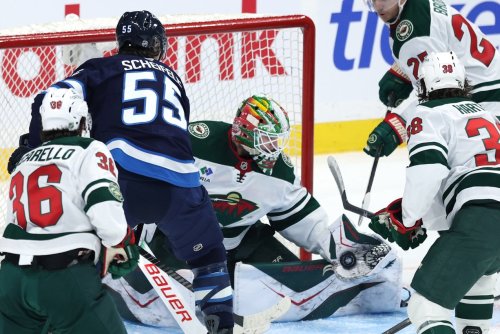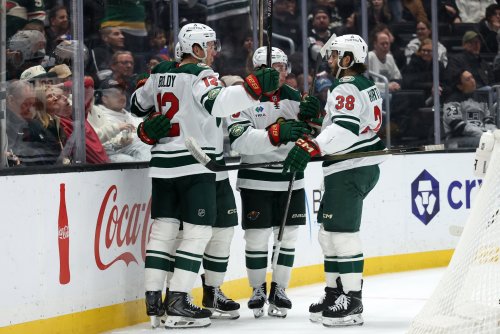
In Minnesota, Independence Day isn't just a celebration of the United States, nor is it merely a movie that chronicles the valiant thwarting of an alien race by Will Smith and Jeff Goldblum.
A day after the Wild fell behind in their Semifinal series 3-2 by losing Game 5 to the Chicago Blackhawks, Deadspin published an article by Ryan Lambert titled "The Minnesota Wild Are Learning the Hard Way: You Can't Buy A Cup". In it, he argues that the Parise and Suter deals elevated the Wild from utter irrelevance to a fine, but ultimately mediocre team. A mediocre team that granted, has some good young players, but has a lot of money tied into these two players for a very long time.
It probably goes without saying that this article drew a lot of attention (and ire) from Minnesota Wild fans, and in fairness to Wild fans, they have played pretty well against Chicago, and are two games away from a Conference Final appearance. But despite what your opinion of Lambert is (I'm fine with him), or the quality of the article (I wasn't incensed), it does bring up questions that should be investigated. So let's do that right now.
But...
So, yes, it's well-known that Free Agency is a much tougher way to try and contend for a Cup than building (i.e., tanking for Top-3 picks) through the draft. You really can't buy a Cup, though? I find that difficult to believe.
Now that we've seen positive examples of free agents (or in LA's case, the acquisition of long-term, big-money deals) that have either earned their teams a Stanley Cup, or a trip to the Stanley Cup Final, let's investigate whether the same can happen to Minnesota.
The old CBA rules were both blessing and curse to the Minnesota Wild. Without the old rules, signing Suter and Parise may never have happened. But having the ability to sign a player to a front-loaded 13-year deal means the Wild took a pretty significant gamble long-term.
First, the Wild bet Parise and Suter can reasonably retain their skills deep into their contracts. Both are pretty good skaters who have good hockey IQs, and it wouldn't surprise anyone if either of them aged well. But who knows what can happen in 5 years? If injuries pile up, or a steep decline happens with either of them, it'll be a nightmare situation for the Wild.
And then, perhaps scariest of all is the threat of cap recapture penalties. As a way to limit the advantage that front-loaded contracts provided, the NHL imposed rules that apply a portion of a player's cap hit to his team's salary cap, should he choose to retire before the completion of his front-loaded contract. If Parise and Suter were each to retire before their Age-38 seasons, the penalty that would count against the cap for the Wild would be just shy of a combined 12.5 million. Per season. For three seasons. 12.5 million of completely dead money.
So, basically, 10 years from now, the Wild had better hope that A) The NHL gives some kind of bail-out to teams with these long, front-loaded deals (similar to the bail-out the NHL gave New Jersey for the penalties they incurred with the Kovalchuk deal), or B) Parise and Suter happen to be the next Selanne and Lidstrom. Good luck.
I think it bears mentioning that the Stanley Cup is extremely hard to win. The odds are stacked against you, with 29 other teams competing for the Cup along with you. In a given year, several great teams will fail to win Lord Stanley's Cup.
While winning a Stanley Cup should be the ultimate goal with any team, I think any realistic person could look at a sustained run of success in a positive light, and I think if the Parise/Suter era can provide a decent stretch of success/relevance/Cup contention, I'd be fairly happy with those deals.
Lambert is right to suggest that the Wild are a team that probably doesn't have everything it needs to be a true contender as of yet. The young players are still developing, and we don't know how much better they'll be. They'll need to work out their volatile goalie situation, solidify the bottom-pairing (whether from within or free agency), and if they could add another talented forward and enable them to roll three scoring lines, even better.
Maybe Lambert is right in saying the Wild need to add a "legitimate superstar" in order to get over the hump and into legitimate playoff contention. If that's so, he's wrong in saying that kind of player can only be added through the draft. Two weeks ago, I wrote an article with many examples from the Wild's own division that showed teams can acquire young star-caliber players through trades or mid-first-round selections.
Maybe the Wild did downgrade their ability to become perennial contenders in order to move their window up significantly when they signed Parise and Suter instead of blowing the team up and tanking for draft picks. I'm still fine with it. The Wild saw a chance to swing for the fences and be aggressive, and they took the opportunity. If their young players are as good as they thought, they could be able to get a legitimate contention window out of those deals. It beats tanking for years, with no guarantee that you'll get the franchise player lottery teams hope for.
And again, the Wild are two games away from winning their series against the Blackhawks. Let's see how that plays out. Maybe they'll surprise everyone, and end up buying their way to the Western Conference finals. It's a lot better than what we're accustomed to here in the State of Hockey.
Think you could write a story like this? Hockey Wilderness wants you to develop your voice, find an audience, and we'll pay you to do it. Just fill out this form.







Recommended Comments
There are no comments to display.
Join the conversation
You can post now and register later. If you have an account, sign in now to post with your account.
Note: Your post will require moderator approval before it will be visible.